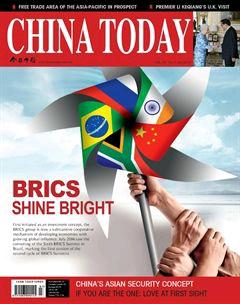Voices
“Developing countries need to take the primary responsibility for national development. At the same time, the international community should help developing countries to build capacity, put in place a fair, equitable, inclusive and well-organized international economic and financial order and enable developing countries to make full use of their resources endowment, take an active part in the global value chain and cultivate a competitive edge in the course of opening-up so that they will benefit from globalization.”
Vice Foreign Minister Li Baodong made the remarks on June 4 at the Post-2015 Development Agenda Workshop, cohosted by the Chinese Ministry of Foreign Affairs and UNDP China. Li also urged the international community to commit to establishing a new type of development partnership.
“China and the U.K. have robust economies. The two nations are now bonding into a growth partnership. This, in turn, will produce opportunities bigger than the simple sum total of the two. China and the U.K. complement each other well.”
Chinese Ambassador to the U.K. Liu Xiaoming made the observations in his speech on June 3 at the First China-U.K. Business Leaders Summit.
Liu went on to state that bilateral trade in the first four months of the year surged 20.6 percent, and that US $4.5 billions worth of Chinese investment entered the U.K. during this period. The U.K. has now risen from its third ranking of last year to become Chinas second largest trading partner in the EU. More than 500 Chinese companies have now established offices in the U.K.
South Reviews
Issue No.12, published on June 1, 2014
Modern Chinese Corporations, 30 Years on
Chinas opening-up and reform harks back to 1978, but it was 1984, when the central authority decided to shift its development focus from the countryside to cities, that marked the start of modern corporations in the country. It was in 1984 that Deng Xiaoping made his southern tour to Shenzhen Special Economic Zone, so giving Chinas business sector a shot in the arm. That year also saw the founding of a multitude of companies, including Lenovo, Vanke, Haier, China Merchants Property Development Co., Ltd., and Shanghai Volkswagen, which later evolved into flagships of their respective industries. Over the past 30 years the growth of Chinese businesses has epitomized the development of Chinese society and the countrys market economy.
Owing to the township company boom, reforms to stateowned enterprises, and the bewildering proliferation of private businesses, the private sector now accounts for over half of Chinese economy. In the process, domestic modern corporations have come into being, so adding impetus to Chinas advance towards the market economy.
But the market economy is not solely about capital. American economist Frank Knight once said that a society should be judged according to the demands it creates and the traits of its people, rather than the efficiency with which it meets the publics current needs. If China is a good society, what role can corporations and businesspeople play in raising Chinas international status and fostering better citizens?
Greater fortunes bring higher social status and prestige, but also more responsibilities. Now that China has reached another historical inflexion point, its entrepreneurs should perform their due roles.

